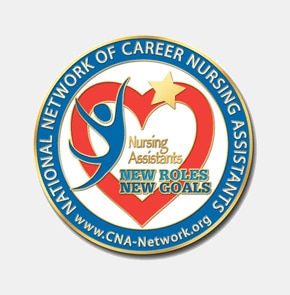Compare Popular Online CNA Programs
What Does a CNA Career Entail?
A Certified Nursing Assistant (CNA) provides essential patient care in a variety of healthcare settings, including nursing homes, long-term care facilities, hospitals, and even organizations like the Red Cross. CNAs play a key role in daily patient care, taking vital signs, monitoring medications, and assisting patients with daily activities. They are often the primary caregivers in inpatient settings, ensuring patients’ comfort and contributing to their overall well-being. For many patients, CNAs are the main source of emotional support and comfort, making them vital members of the healthcare team.
Certified Nurse Assistants (CNAs) play a vital role in patient care, ensuring safety and providing direct support to patients in various healthcare settings, such as hospitals, nursing homes, and long-term care facilities. Under the supervision of registered nurses or medical staff, CNAs assist with daily patient needs, including taking vital signs, managing patient calls, and reporting changes in their condition. They may also lead a team of nurse aides and are often the primary point of communication between patients and healthcare providers.
Experienced CNAs are responsible for regularly monitoring bed-bound patients for signs of injury or other health changes, which is crucial for patients who are elderly or ill. Their work is essential to maintaining the comfort and wellbeing of patients, making them a key member of the healthcare team. By enrolling in the best online CNA classes, individuals can gain the necessary training and certifications to launch a fulfilling and impactful career in patient care.
Becoming a certified nurse assistant (CNA) offers fulfilling work but can be emotionally demanding, as CNAs often form strong bonds with their patients. Many individuals use in-person or online CNA training and certification programs as a stepping stone to advance in healthcare, such as pursuing a registered nurse role or entering higher-level nursing programs at community colleges or nursing schools.

Components of A Successful CNA Career
Attention to Details
CNA work involves following routines and instructions from LPNs, RNs, or other medical staff. In-person or online CNA training emphasizes attention to detail, as each task must be completed accurately and promptly. While online CNA classes are available, a hands-on practicum is required before you can work as a certified nurse assistant.
Caring for People
A CNA must be compassionate, listening to and attending to patient requests. They play a vital role in providing emotional support to patients and families, impacting lives significantly. Nursing programs often include courses on the importance of compassion in caregiving.
Interpersonal Relationships
People skills are an essential ingredient for those who want to have a successful career when they become a CNA. A certified nurse assistant must work well with patients, patient families, LPNs, RNs, and other medical staff such as any nurse aide on their team with them. They must often work in teams or pairs to manage patient groups in hospitals and long-term care settings. Working well with others and in teams is an essential part of a successful CNA career.
Dedication and Self-Motivation
CNA salaries may not be as high as other medical roles, even with a specialization like home care. However, many find fulfillment in caregiving, personal growth, and the gratitude they receive. CNAs can pursue higher-level nursing programs at community colleges or nursing schools to increase earning potential, with online nursing school programs available.
How to Become a CNA
- First, decide that a CNA position is right for you
- Research and apply to state-approved training programs
- Complete approved training
- Pass the state’s CNA examination
- Pass the background check
- Comply with continuing education requirements
What is the difference between a CNA and a Nurse?
The CNA is not a nurse, though they complete full CNA programs and take a CNA certification exam, but many people that become nurses start careers in nursing as a nursing assistant. Nurses must meet educational requirements that typically include an online associate degree or online bachelor’s degree in nursing. They must pass the required national examination; either the NCLEX-RN or NCLEX-PN examination. Nurses must be licensed by the state in which they practice. They have to have training and qualifications for diagnosing and treating patients, including actions such as injections, authorizing medications, and emergency measures.
The CNA works with these nurses and carries out their instructions. State laws require CNAs to work under the supervision of a Registered or Licensed Practical Nurse.
Typical Degree Requirements
 The CNA level does not require a bachelor’s degree, and the job is accessible to anyone with a high school level education and the required training. The CNA designation requires a certificate of Nursing Assistant training. Once complete, CNA program graduates must pass a state level examination to prove competency. If students pass the exam and the other requirements such as criminal background checks, then they can be officially registered and begin practice as a Certified Nursing Assistant.
The CNA level does not require a bachelor’s degree, and the job is accessible to anyone with a high school level education and the required training. The CNA designation requires a certificate of Nursing Assistant training. Once complete, CNA program graduates must pass a state level examination to prove competency. If students pass the exam and the other requirements such as criminal background checks, then they can be officially registered and begin practice as a Certified Nursing Assistant.
Some typical CNA requirements are 180 to 185 hours of training in a CNA training program approved by the state, a passing score on the state competency examination, and a completed personal information and criminal background check submission. Many states have special requirements such as HIV/AIDS training or Opioid Emergency Intervention.
Typical Certifications Needed
State Approval
The required certification to be a nursing assistant is a state level certification of training. The approval comes after completion of an approved school course of study. The typical course of study has class and clinical instruction.
CNA Endorsements
When a certified nursing assistant moves to a new state, they may apply for a CNA Certification Endorsement. This process can permit the CNA to work in the new state without having to go through training and examination all over again. The applicant must meet the training and experience requirements set by the new state for the CNA endorsement.
Voluntary Certifications
To improve wages and gain access to higher paying positions, many students study for voluntary professional certification in specialized areas such as geriatrics, pediatrics, and mental health. These certifications affirm a higher level of learning than the CNA training and dedication to the specific area of medical practice.
Academic Standards
Entry into a CNA training program, which is necessary to become a CNA, only requires minimum previous education, such as a high school diploma or GED. Those intent on becoming a CNA should also be 18 years old and be able to pass a criminal background check. Also, though a high school diploma or GED may be enough to get you into CNA programs for training, it might mean that you need to take extra CNA classes to be able to sit for the certification exam.
The academic standards for CNA training, once you gain access to a training program, cover specific areas of training and education. The overall purpose is to confirm that the graduate will have the necessary basic level of knowledge and skill. Each state sets standards for CNA classes and education.
The CNA certification exam has behind it a certain amount of state-level government authority. Each state sets requirements for training and approves the schools and agencies that can offer CNA training. The standards vary by state, but generally, CNA graduates must be fully equipped to care for patients after their CNA classes and clinical training program are complete. They must know the major human body systems and be able to communicate effectively with patients and other staff, such as the attending doctor or nurse aide at any nursing care facilities where they work.
Exam and Experience Needed
The qualifying certification exam for the CNA profession is the state certification examination. The approved education requirements for each state often include clinical training so that the certified nursing assistant will be prepared to provide care to patients. Clinical training hours can build skills and instill confidence that the assistant can manage the expected tasks as well as the occasional emergency situation.
The second part of the state exam is a skills test. These test required skills and the exams are taken in a clinical setting and evaluated by a registered nurse.
Find Your Online CNA Program
Online Certified Nursing Assistant Degree and Certification Options
The CNA is the lowest entry-level online degree for nursing occupations. It requires about four months of training in a state-approved school or program. The typical overall requirement is about 190 hours of class, lecture, clinical, and lab work.
Some Coursework for CNA Certification:
- Patient Care
- Ethics and Legal Issues
- Medical Terminology
- Anatomy and Physiology
- Infection Control Techniques
- Cardiopulmonary Resuscitation (CPR)
- Automated External Defibrillator (AED) practices
LPN/LVN to RN
There are two other common forms of nursing degree; the LPN to ADN (two-year degree) and LPN to BSN (four-year degree)
Example Coursework for LPN-LVN/RN :
- Transition to Professional Nursing
- Health Assessment
- Pharmacology
- Drug Interactions
- Nursing Research
- Adult Health Nursing
Concentrations for LVN-LPN/RN :
Community-based Nursing, Women’s Health
Cost ranges:
the LPN/LVN to RN costs about $15,000 per year with private schools, which is much higher than public schools.
Careers and Earning Potential
The earning potential for the CNA degree is limited. It is not a high-paying occupation. It does, however, introduce the student to the world of nursing and provides useful experience for shorter routes to the LPN and RN levels.
Find Online Nursing Programs
Fields of Study
- Certified Nursing Assistants is the field of study that trains employees to administer direct care to patients.
- Licensed Practical Nursing is the field of education for practicing nurses that work at the direction of senior nurses and physicians to deliver practical or daily types of care for patients.
- Licensed Vocational Nursing is the similar field to LPN but set in California and Texas.
- Registered Nursing (BSN) is the study of patient care as regulated by state licensing. Registered nursing takes many forms and specializations.
Field of Study Average Salary Range by Degree Level
| Fields of Study | Associate’s Salary | Bachelor’s Salary | Master’s Salary |
|---|---|---|---|
| CAN | $30,760 | $31,917 | $32,647 |
| LPN | $45,611 | $48,390 | $48,814 |
| LVN | $45,611 | $48,390 | $48,814 |
| RN | $67,490 | $75,484 | $110,000 |
Salaries by Occupation
Salary can rise significantly as employees gain educational achievement. The chart below illustrates the CNA occupational classes and the impact of higher education.
Occupations:
-
CNA is the certified nursing assistant designation.
The certification requires completion of a state-approved course of study and passing the state competency exam. CNAs must register and meet continuing education requirements. -
LPN is the licensed practical nurse.
This is a patient-care nursing field that involves the regular day-to-day care of patients in all ages and conditions. LPNs may supervise Certified Nursing Assistants and Nurse’s Aides. The typical qualification is an online associate degree and requires passing a national examination called the NCLEX-PN. -
LVN is the licensed vocational nurse.
This is a practical nursing field designated as LVN in certain states, notably Texas and California. The typical qualification is an online associate degree and a national examination called the NCLEX-PN. -
RN is a Registered Nurse.
These professionals provide a wide range of types of care for patients, education, and administration in healthcare delivery. RNs must pass a national exam called the NCLEX-RN.
Annual Salary Range by Experience and Occupation
| Occupations | Entry-Level | Mid-Career | Late-Career |
|---|---|---|---|
| CNA | $25,400 | $29,200 | $31,000 |
| LPN | $39,200 | $45,600 | $48,100 |
| LVN | $40,800 | $49,600 | $51,200 |
| RN | $56,500 | $67,200 | $72,900 |
Search Online Colleges Offering CNA Classes
Important Questions to Ask
How long does it take to earn a certification online?
The CNA certificate requires training in a course of study approved by the state. The course of study should also have clinical training hours that put the student in real-world situations to apply the lessons learned in classroom settings.
The range of training is eight to twelve weeks. The overall training period can be as short as eight weeks. The training typically required by a state is in the range of 160 to 180 hours, including clinical hours.
How much does this certification cost?

Certificate program costs can range from $1,200 to $2,500. In-state public school rates are generally lower than out-of-state rates and private school rates. Many students choose to begin their nursing careers with the most affordable option, and the CNA course is the fastest and lowest cost option. In some states, public-facing organizations like the Red Cross provide courses for certified nursing assistants. The cost of the coursework typically does not include the cost of the state examinations.
Because students can choose the level of education to complete for their nursing status, the costs can vary quite a bit. Diploma programs have the lowest. The online associate degree is more than a diploma, and a bachelor’s costs more than an associate degree.
Does the school have the major(s) you’re considering?
Since CNA degrees aren’t the same as a bachelor’s, you will need to find an institution that specifically offers a CNA training course. You may find it at a community college, or you might find them available from a college with a large nursing program. Either way, it is a very specific certification, so it shouldn’t be too hard to find out where it is offered near you.
How many students graduate “on time”?
CNA certifications take between eight to twelve weeks of classroom study and supervised clinical activities. When combined with associate degree programs, most students do not finish their associate degree on time but do finish within 150% of the on-time completion rate.
What kind of accreditation does the online program hold? How is it regarded in the field?
Accreditation is always an advantage for a school of nursing. The leading national and regional nursing school accreditation services can provide an extra layer of assurance for students. However, it’s the state that approves schools for CNA training, and this is the vital concern. The student must graduate from a state-approved school to be eligible for the state’s required examinations.
Software/Technology/Skills Needed
Certified Nurse Assistants do not require special software or technical skills. Should they decide to specialize, then there can be specific requirements for operating devices, machines, or computerized systems. For example, there may be some specific technical skills for working with paraplegic patients when moving them with the assistance of machines or automated devices.
Find Online CNA Schools
Scholarships
-
DAR Nursing Scholarships - Caroline Holt Scholarship
Amount: $2,500
Deadline: February 15The scholarship awards three students each year with one-time funds of $2,500. The decision criteria includes financial need. Eligible students must be enrolled in an accredited school of nursing. The student must complete an application and a financial aid form for the committee’s consideration before the application due date.
-
DAR Nursing Scholarships- Mildred Nutting Scholarship
Amount: $2,000
Deadline: February 15This award is for nursing students currently accepted or enrolled in an accredited school of nursing. The award standard prefers residents from the Lowell, MA area. The committee awards two students each year. CNA students that intend to enroll in online degree programs can apply for this scholarship for LPN and LVN to RN, associate, or MSN degrees
-
FNSNA Undergraduate Scholarship Program - Promise of Nursing Program
Amount: $1,000-$7,500
Deadline: JanuaryThe promise of nursing program works through participating schools of nursing. Students should check to see whether their school or college zip code meets the location requirements for this program. CNA students enrolled in a combination program for LPN or LVN can apply for this scholarship. It is open to students currently enrolled in a state-approved nursing program that included LPN or LVN to RN completion. The categories include pre-nursing students taking courses for entry into a nursing program. Students must show involvement with student nursing organizations, and community health activities.
Professional Organizations
- NAHCA
- NNCNA
- SNJ
- AAN
- NAPNES

NAHCA
National Association of Health Care Assistants
The NAHCA is an organization of CNAs that advocates for the profession and its membership. Students can join the association during the time that they attend certification classes. The association works to provide benefits for its members including continuing education and costs savings for professional and personal activities. The association promotes the image of the Certified Nursing Assistant profession by emphasizing its importance to the entire healthcare delivery system. The association is the voice of the industry, and it takes positions on public policies and legislation that affect health benefits and support for special populations like children, older Americans, and veterans.

NNCNA
National Network of Career Nursing Assistants
This organization promotes education and career advancement for nursing assistants. The association has a program of peer support to reduce the stress of working closely with patients in all age groups and conditions of health. It urges greater awareness of the profession and its contributions. The organization operates specific types of projects such as the advocacy program for nurse assistants in nursing homes and other long-term career settings. The organization has a task force on Male Nursing Assistants to promote increased participation and address specific areas of interest for that population. The association advocates policies that expand healthcare services and promote health education.

SNJ
The Student Nurse Journey
This is a helpful organization for students and nurses at all levels of the profession. The group offers information about nursing that ranges from the day-to-day routines to the history of nursing in the US and around the world. The site offers detailed tutorials and educational videos to make learning easier in the classroom and the practice lab. For CNAs with a longer-term view towards nursing practice, this site can accelerate learning and reinforce the CNA classwork and test preparation.

AAN
The American Academy of Nursing
This group is an excellent choice for nursing students at all levels of the profession. This large, well-organized group plays a role in shaping the national discussion on health policy. It urges the adoption of measures that increase the availability of health services to the US population. In the field of nursing, the organization works for greater recognition and awareness of the vital role that nurses play in the healthcare system both in the delivery of services, care for vulnerable populations, and research and innovation. The organization has a wide range of information and education resources. Nursing students can take advantage of the opportunities to learn more about the overall nursing profession.

NAPNES
National Association for Practical Nurse Education and Service
Many CNA students seek to move into licensed nursing either after their CNA certification or as a combination program. NAPNES is an advocacy organization focused on licensed practical nurses, licensed vocational nurses, and related educational institutions. NAPNES also advocates for practical nursing educators, practical nursing schools, and practical nursing students. CNAs that wish to advance to the next step can join this organization. CNA students can join and get the benefits of educational resources, news, and information on trends within the practical nursing care sector.
Choosing an Accredited College
State licensing requires attendance at a state-approved education provider. Accreditation may also add to the value of the certificate and to the means for paying for the education. Some federal and other public loans and grants require attendance at an accredited school, college, or university.
Online vs. On-Campus vs. Hybrid
On-campus choices are typically convenient because the CNA course is relatively short. The total hours may be as little as 150 hours including classroom, clinical, and laboratory sessions. The convenience of performing lab and clinical work under one set of instructors can be appealing to students.
Online courses for the CNA are excellent choices for working students, those engaged in a business, and people with social or family obligations that interfere with full-time classroom attendance. Many people may prefer online education because it is convenient and flexible. Students can perform the clinical work required for online certification courses at affiliated hospitals and clinics.
Hybrid education offers the same advantages as Online and on-campus coursework. The student can determine the amount and timing of the online versus on-campus classwork. Some CNA students may prefer on-campus work for supervised lab practice.
Frequently Asked Questions
How are these programs taught?
First, there is the option to find an accredited program so that you know your training will be up to snuff. Accreditation will indicate that your class is being taught by a highly qualified teacher who provides an excellent educational experience. Once you ensure this is the case, you can focus on finding the classroom environment you prefer. There are, of course, 100% in-classroom, instructor-led programs that will ensure you get all the hands-on training you need to understand everything about your new career. Or, if you aren’t as worried about the hands-on aspect of your training experience, you might choose to attend through a blended learning environment. This means that you will do some of your learning online, while other training days or courses happen in the classroom. Even if you take practically your whole program online, you will need to complete an in-person clinical to graduate.
What do I do if my certification has expired?
This greatly depends on the state you are in and the requirements of the nursing board in your state. Some states require that you have worked within the last two years or that you earn some number of continuing education courses if you have not (see, California) or if your license is two years expired. You may have to earn these credits and/or take a competency exam before you are able to renew your license/certification.
Does the College Have Post-Graduate Job Placement Help & Assistance?
The CNA program can offer job placement assistance, career, counseling, and job interview assistance. These are benefits for every student and will help employers find the best talent for their openings. The current demand for CNAs is high, and health employers of nearly every kind rely upon the work that CNAs perform. These include nursing facilities, long-term care facilities, skilled nursing facilities, and nearly every type of hospital.
Why You Need to Consider the Overall National Rankings of the College and The Effects on Your Career or Salary
The rankings for schools of nursing play a role in the response of employers and educational institutions to the degrees and credit hours earned by students. Rankings reflect the care that schools use when selecting, retaining, and training students for the CNA certificate. Employers rely on factors such as rankings, reputation, and the typical success of graduates of a school or program. Because employers consider these things when making selections for interviews and hires, the rank and reputation affect the opportunities available for graduates and the willingness of employers to pay top scale wages.
Search All Programs
